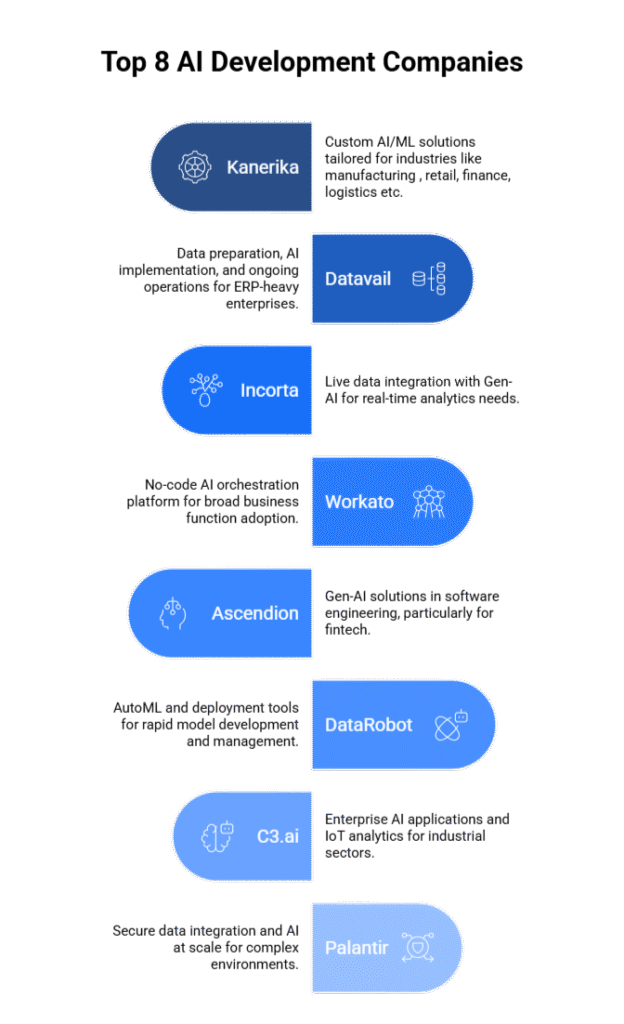In 2025, AI development companies are playing a critical role in redefining enterprise technology, driving large-scale innovation, and unlocking competitive advantage across every sector. For tech leaders, the question is no longer whether to adopt AI—but how fast and how far.
Industry pioneers like OpenAI, creators of ChatGPT, have already demonstrated the transformative potential of generative AI—from streamlining operations and enhancing customer engagement to powering intelligent automation at scale. According to PwC, AI is projected to contribute $15.7 trillion to the global economy by 2030, a signal of both its strategic importance and disruptive power.
Today’s AI development companies are building more than tools—they’re creating adaptive systems that learn, evolve, and deliver real-time intelligence. Whether it’s deploying predictive analytics in supply chains, automating compliance in financial services, or driving precision in healthcare diagnostics, these companies are turning AI from an aspiration into a competitive differentiator.
In this blog, we’ll explore how top AI development companies are shaping the technological landscape in 2025, the high-impact solutions they’re delivering, and how forward-thinking organizations can partner with them to drive innovation, scalability, and long-term value.
Why Are AI Development Companies Essential for Businesses?
1. AI Adoption
Businesses today must use AI to stay ahead of competitors. Companies that don’t adopt smart technology risk falling behind as their rivals become faster and more efficient. AI development companies help businesses make this transition smoothly.
2. Cost Efficiency
These AI companies help businesses save money by creating systems that handle repetitive tasks automatically. Instead of having employees spend hours on data entry or simple calculations, AI tools can do the work faster and without breaks, cutting down on labor costs.
3. Data Utilization
Most businesses collect lots of information but don’t know what to do with it. AI development companies build tools that turn this raw data into useful insights, helping business owners make better decisions about inventory, pricing, and customer preferences.
4. Innovation
AI companies bring fresh ideas that improve products and services. They create chatbots for better customer service, recommendation systems that suggest products customers want, and tools that predict what might go wrong before it happens.
5. Industry Impact
AI is changing every industry. In healthcare, doctors can diagnose diseases faster. In finance, it detects fraud instantly. Retail stores use it to manage inventory, while manufacturers use it to prevent equipment breakdowns and improve quality control.
How to Choose the Right AI Development Company
1. Experience and Expertise
Look for companies that have worked in your business area and understand how AI can help solve your specific problems. They should know your industry’s rules, challenges, and what works best. Experience matters because every business has different needs.
2. Portfolio and Case Studies
Ask to see examples of their past work with real results. Good companies will show you actual projects they’ve completed, what problems they solved, and how much they helped their clients. This proves they can deliver what they promise.
3. Technical Skills
Make sure the team knows the right technology for your project. They should be comfortable working with different AI tools and programming languages. However, focus more on whether they can solve your problem rather than just listing technical terms.
4. Custom Solutions
Choose a company that will build something specifically for your business, not just sell you a ready-made product. Your business is unique, so your AI solution should fit your exact needs and work well with your current systems.
5. Ongoing Support
Pick a company that will help you after they build your AI system. AI needs regular updates and maintenance to keep working properly. Make sure they offer training for your team and will fix problems when they come up.
6. Client Feedback
Talk to their previous customers to learn about their experience. Read reviews and ask for references. Find out if clients were happy with both the final product and how the company treated them during the project.

Key Services Offered by AI Development Companies
1. Custom AI Solutions
AI companies build personalized tools for each business’s unique problems. Whether a company needs help sorting customer emails or predicting when equipment might break, they create software specifically designed for those tasks.
2. Machine Learning and Deep Learning
These services create smart programs that get better at their jobs over time. Like how a person learns from experience, these systems study data patterns and improve their performance without being reprogrammed.
3. Natural Language Processing (NLP)
This service helps computers understand and respond to human language. Companies use it to build chatbots that can have real conversations with customers, translate languages automatically, or analyze what people are saying about their brand online.
4. Computer Vision
AI companies teach computers to “see” and understand images and videos. Security companies use this to spot suspicious activity, hospitals use it to read medical scans, and car manufacturers use it for safety features that detect obstacles.
5. AI Consultation
These companies help business owners figure out where AI could help them most. They study how a business works and suggest which processes could be improved with smart technology, helping prioritize the most valuable opportunities.
6. Integration Services
AI companies make sure new smart tools work smoothly with a business’s existing software and processes. They handle the technical setup so everything connects properly without disrupting daily operations.
Top 8 AI Development Companies in 2025
1. Kanerika
Strengths:
- End-to-end AI/ML development
- Generative AI agents and automation
- Strong in data integration (ETL/ELT), RPA, and analytics
- Custom AI solutions aligned with business workflows
Industries Served:
- Manufacturing, logistics, finance, insurance, retail, packaging
Notable Projects:
- Sales Forecasting for Packaging Firm: Used time-series forecasting and LLMs to reach 85% accuracy. Reduced churn risk by 50%. Built dashboards with Power BI.
- AI for Logistics Optimization: Developed a predictive AI engine that helped reduce delivery costs and improve shipment visibility.
- Insurance Reporting Automation: Used Gen-AI and data pipelines to speed up reporting and cut manual work.
- AI Recommendation System: Delivered context-aware recommendation agents for enterprise decision-making.
Certifications & Partners:
- Microsoft, AWS, Databricks, Informatica
- CMMi Level 3, ISO 27001/27701, SOC 2
Why It Matters:
Kanerika stands out for delivering highly customized AI applications, especially where businesses need both data handling and intelligent automation.
2. Datavail
Strengths: Data engineering, AI/ML development, managed MLOps, Oracle/ERP integration
Industries Served: Enterprise IT, finance, Oracle-based businesses
Notable Projects:
- Full AI/ML builds with 24/7 operational support
- Embedded AI within Oracle enterprise apps
Why It Matters: Ideal for firms needing robust AI systems integrated into their ERP landscape.
3. Incorta
Strengths: Real-time analytics, data pipelines, embedded Gen-AI
Industries Served: Finance, healthcare, manufacturing, enterprise software
Notable Projects:
- Incorta X: Enables live Gen-AI modeling on raw operational data
- Hospital networks predicting patient admissions and improving patient experience
Why It Matters: Provides live, actionable AI insights directly on enterprise data without heavy ETL.
4. Workato
Strengths: No-code/low-code automation, AI-powered workflows, wide connector support
Industries Served: Tech, finance, HR, support across large enterprises
Notable Projects:
- Workato One platform with AI agent studio and governance tools
- Gen-AI integration into business workflows: email, translation, support bots
Why It Matters: Empowers any team to deploy AI-driven automation without deep coding.
5. Ascendion
Strengths: AI-first engineering, generative development, talent orchestration
Industries Served: Banking, fintech, high-tech, enterprise IT
Notable Projects:
- Increased engineering productivity by 30–50% using Gen-AI
- Built “Zenith” platform for Axos Bank for wealth management
Why It Matters: Helps enterprises build AI-powered software products with strong delivery and scale.
6. DataRobot
Strengths: Automated machine learning (AutoML), model deployment, monitoring
Industries Served: Finance, healthcare, manufacturing, retail
Notable Projects:
- Enables business teams to build and deploy models without coding
- Used for fraud detection, demand forecasting, patient risk analysis
Why It Matters: Speeds up model creation and deployment with enterprise-grade governance.
7. C3.ai
Strengths: Enterprise AI suite, predictive analytics, IoT integration
Industries Served: Energy, utilities, manufacturing, defense
Notable Projects:
- Predictive maintenance platforms for industrial and energy customers
- AI-enabled asset optimization for supply chain
Why It Matters: Offers turnkey AI applications with infrastructure to support heavy industrial use cases.
8. Palantir Technologies
Strengths: Large-scale data integration, AI analytics, deployment at scale
Industries Served: Government, defense, finance, healthcare, manufacturing
Notable Projects:
- Foundry platform helps enterprises integrate siloed data and run AI analytics
- Used for pandemic tracking, supply chain resilience, financial crime detection
Why It Matters: Makes AI powerful in complex and sensitive environments with strong security and integration.
Comparison Table:
| Company | Strengths | Best For |
| Kanerika | Custom AI/ML, workflow-aligned | Manufacturing, logistics, finance, insurance |
| Datavail | Data prep + AI + ongoing ops | ERP-heavy enterprises |
| Incorta | Live data + Gen-AI in analytics | Teams needing AI on real-time data |
| Workato | No-code AI orchestration | Broad adoption across business functions |
| Ascendion | Gen-AI in software engineering | Fintech, enterprise software development |
| DataRobot | AutoML + deployment tools | Rapid model development and management |
| C3.ai | Enterprise AI apps + IoT analytics | Industrial, energy, defense sectors |
| Palantir | Secure data integration + AI at scale | Complex, regulated, or mission-critical environments |

Emerging Players
Since the start of 2024, thousands of new AI companies have formed, and funding to AI companies has surpassed $170B, creating a dynamic ecosystem of innovative startups. Notable emerging companies include Anthropic and OpenAI, which have secured substantial funding rounds and are pushing the boundaries of large language models and generative AI.
The startup ecosystem is particularly vibrant, with Y Combinator alone funding over 100 AI startups in 2025. These emerging players often focus on specific applications or novel approaches to AI, from autonomous systems to specialized industry solutions, bringing fresh perspectives and agile development to the market.
Niche Providers
Industry-specific AI specialists are gaining significant traction by addressing unique sector challenges. In healthcare, companies like XpertDox are revolutionizing medical coding with AI platforms that automatically code over 94% of claims, while companies like Abridge and RadAI focus on administrative AI solutions. Administrative AI accounts for 60% of total AI investment in healthcare, demonstrating the sector’s focus on operational efficiency.
Financial services see specialized providers like Lendbuzz using advanced AI to analyze risk and provide credit opportunities to the 45 million U.S. residents categorized as “credit invisible”. Retail AI specialists are developing solutions for personalized shopping experiences, inventory optimization, and customer service automation, tailoring their technologies to address the unique challenges of commerce and consumer engagement.
Benefits of Partnering with AI Development Companies
Working with AI development companies gives businesses several key advantages that can transform their operations and boost competitiveness.
- Accelerated Innovation happens when you tap into expert knowledge and creative problem-solving. These companies bring fresh ideas and proven methods that would take years to develop on their own.
- Scalability: becomes possible as smart solutions handle more work and data without hiring more staff or increasing costs proportionally.
- Competitiveness comes from better productivity, lower costs, and improved customer service. Automation handles routine tasks while providing better insights, which leads to more informed and intelligent decisions.
- Cost Savings: add up through automated tasks, equipment that fixes itself before breaking, and decisions based on solid data rather than guesswork.
- Customization means you get exactly what your business needs, rather than generic software that doesn’t quite work for your specific situation.
- Faster Time to Market: This happens when experts guide the process using tested methods, helping you launch products and services quicker while maintaining quality.

How AI Development Companies Are Impacting Key Industries
1. Healthcare
AI is revolutionizing healthcare by creating personalized treatment plans for patients, helping doctors diagnose diseases faster and more accurately, and enabling robot-assisted surgeries. These smart systems can spot health problems earlier than human doctors might notice, potentially saving lives.
Example: IBM Watson Health analyzes medical data to help doctors make better treatment decisions.
2. Retail & E-commerce
Online stores use AI to suggest products you might like, predict what items will sell well, and create personalized shopping experiences. This helps customers find what they want faster while helping businesses manage their inventory better.
Example: Amazon uses AI to recommend products and manage its massive delivery network.
3. Finance & Banking
Banks use AI to catch fraud instantly, decide who qualifies for loans, and provide customer service through chatbots. These systems can process transactions 24/7 and spot suspicious activity that humans might miss.
Example: Zest AI helps banks make fairer lending decisions using smart data analysis.
4. Manufacturing
Factories use AI to predict when machines might break down, automate production lines, and optimize supply chains. This reduces downtime and waste while improving product quality.
Example: Siemens uses AI in factories to predict equipment failures before they happen.
5. Transportation
AI powers self-driving cars, finds the best routes for deliveries, and improves logistics. These systems can react faster than human drivers and optimize traffic flow.
Example: Tesla’s cars use AI to navigate roads and avoid accidents.
How AI Development Companies Are Making Technology More Accessible
1. AI-as-a-Service (AIaaS)
- AI companies offer ready-to-use AI tools through the internet, like email or streaming services
- Businesses can access powerful AI features without buying expensive equipment
- Companies don’t need to hire large technical teams to use AI
- This approach lets businesses test AI solutions quickly and affordably
Example: Google AI, Microsoft Azure AI, and Amazon Web Services (AWS) provide cloud-based AI tools that businesses can use immediately
2. Open Source AI Tools
- Many AI companies share their basic building blocks for free
- Anyone can create AI applications using these free tools
- Developers worldwide get access to the same technology that powers major companies
- This levels the playing field for innovation across all business sizes
- Key tools like TensorFlow, PyTorch, and Keras allow developers to build smart applications without starting from scratch
3. Customization for Small Businesses
- AI companies create affordable, scaled-down solutions for small businesses and startups
- They build AI tools that match smaller budgets and simpler needs
- Local businesses can use the same type of smart technology as large corporations
- Solutions are tailored to specific business requirements rather than one-size-fits-all approaches
These approaches have transformed AI from exclusive technology for tech giants into accessible tools that any business can use.
Transform Your Business with AI-Powered Solutions!
Partner with Kanerika for Expert AI implementation Services
Cost of Hiring an AI Development Company
Pricing Models
1. Fixed-Bid
- You pay one agreed price for the entire project
- Best for projects with clear requirements and defined scope
- Company takes the risk if project takes longer than expected
- Good for businesses with tight budgets who need cost certainty
2. Time & Materials (T&M)
- You pay for actual hours worked plus materials used
- Hourly rates typically range from $50-$200 depending on expertise level
- Flexible approach that allows changes during development
- Better for complex projects where requirements might evolve
3. Retainer
- Monthly fee for ongoing AI development and support
- Provides dedicated team access for continuous improvements
- Usually includes maintenance, updates, and new feature development
- Ideal for long-term AI strategy implementation
Rough Pricing Tiers
1. Startup Level
- Simple AI tools: $10,000 – $50,000
- Basic chatbots or recommendation systems
- Limited customization and features
2. Enterprise Level
- Complex AI systems: $100,000 – $1,000,000+
- Advanced machine learning models with custom features
- Full integration with existing business systems
- Ongoing support and scaling capabilities
Factors Affecting Cost
1. Project Scope
- Number of features and functionalities required
- Integration complexity with existing systems
- Timeline and delivery speed requirements
2. Model Complexity
- Simple rule-based systems vs. advanced learning algorithms
- Amount of data processing required
- Accuracy and performance expectations
3. Infrastructure Needs
- Cloud computing resources and storage requirements
- Security and compliance standards
- Scalability and performance demands
Common Pitfalls to Avoid When Working with AI Development Providers
Bringing artificial intelligence into your business sounds exciting. Done right, it can save money, improve decision-making, and automate repetitive work. But far too often, AI projects fizzle out.
They get stuck in endless testing. Or worse—they go live and no one uses them.
To avoid these traps, you need more than just a smart model. You need clear thinking and solid execution. Below are some of the most common mistakes companies make when working with AI development firms—and how to steer clear of them.
1. Hiring Without a Clear Business Case
Why it’s a problem:
Many companies jump into AI because of hype or FOMO. They bring in consultants, buy tools, and spin up teams—without first asking: “What exactly are we trying to improve?”
When there’s no clear use case or business goal, the result is often a good-looking prototype that doesn’t solve anything meaningful.
What to do instead:
Start with a pain point. Maybe your forecasting is unreliable, support tickets take too long, or logistics is a mess. Define the problem in simple business terms. What would a successful outcome look like? How would you measure it?
AI should be a means to a result, not the result itself.
2. Overengineering for Minimal Value
Why it’s a problem:
It’s tempting to build a “perfect” AI system—custom model, complex architecture, endless tuning. But if you’re solving a basic problem (like sorting documents or detecting duplicates), you don’t need a PhD-grade setup.
Overengineering leads to higher costs, slower rollouts, and hard-to-maintain systems.
What to do instead:
Start small. Use off-the-shelf models or basic automation tools first. If that works, scale up. Focus on delivering value quickly, even if the solution is simple.
Remember: “Done and used” beats “perfect but unused.”
3. Choosing a Provider Lacking Deployment or Ops Experience
Why it’s a problem:
Some firms are great at building models—but can’t get them into production. You end up with impressive proof-of-concept stuck in PowerPoint, or worse—a fragile system that breaks under real-world pressure.
What to do instead:
Ask about their deployment experience. Have they managed MLOps pipelines? Can they support model retraining and monitoring? Do they understand how AI fits into business systems (CRM, ERP, etc.)?
A working AI model means nothing if it can’t be used at scale, updated over time, or supported in real business settings.
4. Focusing Only on Tech and Ignoring Change Management
Why it’s a problem:
You finally get the AI system live… and no one uses it. Teams don’t trust it, processes don’t change, and it quietly dies in a corner.
This happens when AI is treated like a tech project, not a people’s project.
What to do instead:
Plan for adoption from day one. Talk to the teams who will use or be affected by the AI. Involve them in testing. Train them. Update processes. Show how the AI helps—not replaces—them.
Adoption won’t happen by accident. You have to build it in.
Final Thoughts
AI can absolutely transform how businesses operate—but only if it’s aimed at real problems, built with the right mindset, and deployed with people in mind.
- Don’t jump in without a business case
- Don’t build something bigger than the problem demands
- Don’t choose a firm that can’t deliver beyond the prototype
- Don’t forget the people who will actually use the thing
Get this right, and you’ve already avoided 90% of the reasons AI projects fail.

The Future of AI Development Companies
- Human-Computer Collaboration: Technology will work alongside people instead of replacing them and smart systems help executives make better business decisions
- Example: Decision support tools analyze market trends to guide leadership choices
- Environmental Solutions: Companies focus on solving climate change through smart technology. As well as systems optimize energy use and reduce waste in factories and offices. Also, better resource management across farming, manufacturing, and city planning
- Self-Operating Systems: Smart systems expand beyond self-driving cars into warehouses and hospitals. Moreover, companies build systems that work independently while staying safe. Automated solutions handle complex tasks in medical procedures and delivery services
- Making Technology Available to Everyone: Development companies create affordable solutions for small businesses. Consequently, easy-to-use platforms help any company access advanced capabilities. Also, small enterprises can now use the same tools as large corporations
- Responsible Development: Companies prioritize building technology that benefits society. Moreover, fairness and transparency become requirements in all applications. Success depends on creating systems that align with human values and community needs
Strategic AI Integration of Business Growth for AI Development Companies
- Collaborating with Custom Solutions: Partner with development companies to create solutions for specific business problems. Working together to identify challenges that need specialized approaches.
- Adopting Technology to Drive Efficiency: Implement automation to handle repetitive tasks and reduce manual work. As well as using data analysis tools to make better business decisions. Deploy customer service systems that provide round-the-clock support.
- Ensuring Growth Capability: Work with developers to build solutions that expand your business. Plan systems that handle more users and information without failing along with designing flexible solutions that adapt to changing needs.
- Staying Competitive: Continuously update existing systems with new features and should monitor industry trends and adopt emerging technologies early. Training employees to work effectively with new systems along with maintaining advantage by evolving operations alongside technological advances.

Power Your Business with Kanerika’s AI Expertise
At Kanerika, we help businesses tap into the full potential of AI to solve real problems, improve operations, and stay ahead of the competition. Our AI solutions are built to drive efficiency, reduce costs, and unlock smarter decision-making across industries—while upholding the highest ethical standards.
We build AI with a strong foundation in responsible design, prioritizing data security, privacy, and transparency. Our practices align with globally recognized standards including ISO 27701 & 27001, SOC 2, GDPR, and other compliance frameworks to ensure trustworthy and legally sound implementations.
We also offer advanced capabilities in AI-powered surveillance, enabling real-time behavior detection, cross-camera tracking, 3D scene reconstruction, and facial analytics. These solutions empower clients in public safety, education, retail, and manufacturing to transition from traditional monitoring to intelligent, proactive security.
From process automation and predictive analytics to intelligent data governance, our services are built for impact. We also support end-to-end data migration, enabling businesses to modernize infrastructure and unlock future-ready capabilities without disruption.
With Kanerika as your AI partner, you’re not just adopting new tech—you’re building smarter, faster, and more resilient operations that scale up with your goals.
Elevate Organizational Productivity by Integrating Agentic AI!
Partner with Kanerika for Expert AI implementation Services
FAQs
1. What services do AI development companies typically offer?
AI development companies usually provide services such as machine learning model development, natural language processing (NLP), computer vision, AI-powered chatbots, predictive analytics, and AI consulting. Many also offer AI integration into existing systems and custom AI solution development.
2. How do I choose the right AI development company for my business?
Consider the company’s domain expertise, previous case studies, technology stack, scalability of solutions, data privacy standards, and client reviews. Industry experience in your specific sector (e.g., healthcare, retail, finance) is also a big plus.
3. What industries benefit the most from AI solutions?
Industries like healthcare, finance, e-commerce, logistics, manufacturing, and marketing see high ROI from AI through automation, enhanced decision-making, customer personalization, and process optimization.
4. How long does it take to develop an AI solution?
Depending on complexity, it can take anywhere from 4 weeks to 6 months or more. Factors include data availability, algorithm complexity, integration needs, and testing requirements.
5. How much does it cost to hire an AI development company?
Costs vary widely—basic solutions may start at $10,000–$30,000, while enterprise-grade platforms with ongoing support and AI training may cost $100,000+. Pricing depends on scope, tech stack, and engagement model.
6. Can AI development companies help with existing product enhancement?
Yes. Many companies specialize in augmenting existing systems with AI capabilities like automation, recommendation engines, fraud detection, and smart analytics.
7. What technologies do top AI companies use?
Leading companies use frameworks like TensorFlow, PyTorch, Keras, and tools like OpenAI APIs, AWS SageMaker, Microsoft Azure AI, Google Cloud AI, and NLP libraries such as spaCy or Hugging Face Transformers.





